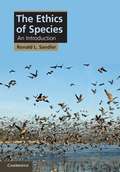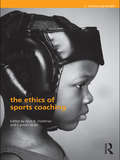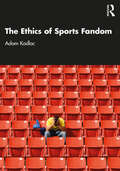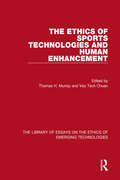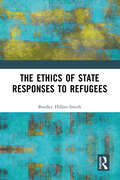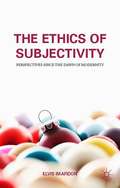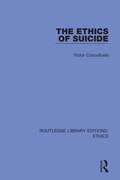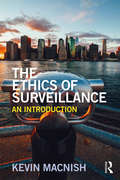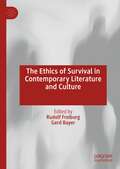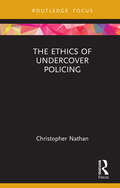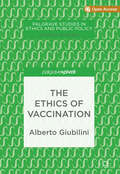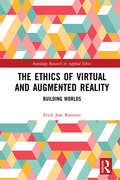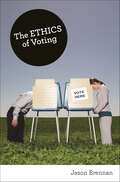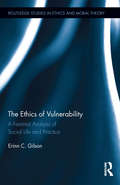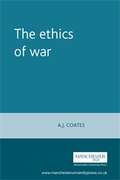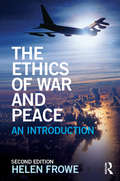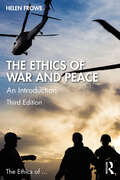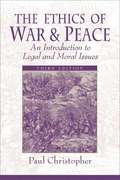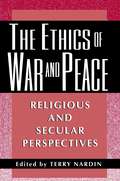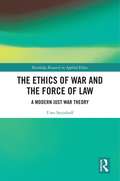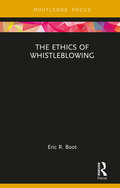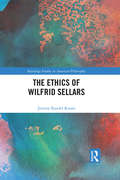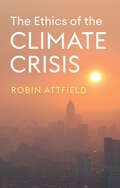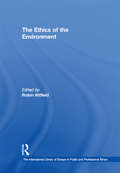- Table View
- List View
The Ethics of Species
by Ronald L. SandlerWe are causing species to go extinct at extraordinary rates, altering existing species in unprecedented ways and creating entirely new species. More than ever before, we require an ethic of species to guide our interactions with them. In this book, Ronald L. Sandler examines the value of species and the ethical significance of species boundaries and discusses what these mean for species preservation in the light of global climate change, species engineering and human enhancement. He argues that species possess several varieties of value, but they are not sacred. It is sometimes permissible to alter species, let them go extinct (even when we are a cause of the extinction) and invent new ones. Philosophically rigorous, accessible and illustrated with examples drawn from contemporary science, this book will be of interest to students of philosophy, bioethics, environmental ethics and conservation biology.
The Ethics of Sports Coaching (Ethics and Sport)
by Alun R. HardmanIs the role of the sports coach simply to improve sporting performance? What are the key ethical issues in sports coaching practice? Despite the increasing sophistication of our understanding of the player-sport-coach relationship, the dominant perspective of the sports coach is still an instrumental one, focused almost exclusively on performance, achievement and competitive success. In this ground-breaking new book, leading sport scholars challenge that view, arguing that the coaching process is an inherently moral one with an inescapably ethical dimension, involving intense relationships between players and coaches. The Ethics of Sports Coaching critically examines this moral aspect, develops a powerful idea of what sports coaching ought to be, and argues strongly that coaches must be aware of the ethical implications of their acts. The book is structured around four central themes: the nature of coaching, the character of the coach, coaching specific populations and specific coaching contexts. It explores in detail many of the key ethical issues in contemporary sports coaching, including: coaching special populations the ethics of talent identification understanding the limits of performance enhancement coaching dangerous sports expatriate coaching setting professional standards in sports coaching. Combining powerful theoretical positions with clear insights into the everyday realities of sports coaching practice, this is an agenda-setting book. It is essential reading for all students, researchers and practitioners with an interest in sports coaching or the ethics and philosophy of sport.
The Ethics of Sports Fandom
by Adam KadlacFans largely regard sports as an escapist pursuit—something that provides distraction from the cares and concerns of "real life." This book pushes back against a fully escapist account of sports fandom and argues that we should understand the value of fandom in terms of the ability of sports to prompt fans to reflect meaningfully on the notion of a good life. Even if we are not engaged in high-level athletics, it is possible to learn a great deal from those who are: what sacrifices are required to achieve our goals; how to persevere through failure and disappointment; and about teamwork and the rewards of accomplishing things together. Moreover, partisan fandom, which has been criticized from various quarters, can teach us valuable lessons about love and what it means to be invested in things over which we have no control. If our reflection on the efforts of individual athletes helps us reflect on our own pursuit of the good life, our attachments to teams can help us to cultivate a certain kind of humility and openness to all that life has to offer. The Ethics of Sports Fandom is an accessible resource for researchers and students interested in the ethics and philosophy of sport that offers an analysis of several different aspects of contemporary fandom: fantasy sports, the ways that fans interact with athletes on social media, violent sports, women’s sports, and the support for our countries’ national teams. In all these areas, reflecting on what it means to respect athletes as individual human beings engaged in their own pursuit of the good life requires that fans consider their sports-related behavior in a new light.
The Ethics of Sports Technologies and Human Enhancement (The\library Of Essays On The Ethics Of Emerging Technologies Ser.)
by Thomas H. Murray Voo Teck ChuanThis volume presents articles which focus on the ethical evaluation of performance-enhancing technologies in sport. The collection considers whether drug doping should be banned; the rationale of not banning ethically contested innovations such as hypoxic chambers; and the implications of the prospects of human genetic engineering for the notion of sport as a development of ’natural’ talent towards human excellence. The essays demonstrate the significance of the principles of preventing harm, ensuring fairness and preserving meaning to appraise whether a particular performance enhancer is acceptable in the context of sport. Selected essays on various forms of human enhancement outside of sport that highlight other principles and concepts are included for comparative purpose. Sport enhancement provides a useful starting point to work through the ethics of enhancement in other human practices and endeavors, and sport enhancement ethics should track broader bioethical debates on human enhancement. As a whole, the volume points to the need to consider the values and meanings that people seek in a given sphere of human activity and their associated principles to arrive at a morally grounded and reasonable approach to enhancement ethics.
The Ethics of State Responses to Refugees
by Bradley Hillier-SmithThis book appears at a time of intense debate on how states should respond to refugees: some philosophers argue states are not necessarily obligated to admit a single refugee, others argue states should continually admit refugees until the point of societal collapse. Some politicians argue for increasing refugee resettlement, others seek to prevent refugees from arriving at the border. Some countries provide expansive welcome schemes and have taken in over a million refugees, others have erected concrete walls and barbed wire fences.The Ethics of State Responses to Refugees provides an account of what an ethical response would be by developing an understanding of the moral duties that states have towards refugees. The first half of the book analyses state practices used in response to refugees, to understand the negative duties of states not to harm or violate the rights of innocent refugees. The second half analyses morally significant features of contemporary refugee displacement, to understand the positive duties of states to alleviate the distinctive harms and injustices that refugees face. The two halves together thereby outline the negative and positive duties of states towards refugees which together constitute the elements of an ethical response. The book then demonstrates this ethical response is not only urgently required but is also within reach.
The Ethics of Subjectivity
by Elvis ImafidonThe condition into which humans entered since the dawn of modernity altered and led to the disenchantment of traditional (pre-modern) ways of thinking and theorizing in the different spheres of being and discourse mainly due to an emphasis on reason, freedom and the autonomy of the subject. Ethics in particular has continued to experience since modernity a shift from preoccupation with fixated, absolutist systems of ethics such as those built on notions of God and nature to a preoccupationwith the formal, individualistic, fallible or subjective ethical systems that ensue from free and autonomous subjects. The Ethics of Subjectivity presents an examination and analysis of the theorization of this subject-based ethics particularly as presented in the works of key ethicists and philosopher since modernity. These key figures include Kant, Hegel, Bradley, Nietzsche, Foucault, Derrida, Popper, Feyerabend, Habermas, Lacan and Levinas. The volume also examines the implications of the shift to the subject as the focal point of modern ethics for the ever-evolving field of ethics.
The Ethics of Suicide
by Victor CosculluelaOriginally published in 1995, this volume addresses a topical subject: assisted suicide. The book discusses the issues surrounding the morality of suicide and in so doing clarifies the literature in applied ethics. It critiques the complex moral and religious arguments on the topic offered by philosophers and theologians. It establishes a middle position between those who hold that suicide is never morally permissible and those who claim it always is and it determines when second parties ought to aid and when they ought to prevent suicides.
The Ethics of Surveillance: An Introduction (The Ethics of ...)
by Kevin MacnishThe Ethics of Surveillance: An Introduction systematically and comprehensively examines the ethical issues surrounding the concept of surveillance. Addressing important questions such as: Is it ever acceptable to spy on one's allies? To what degree should the state be able to intrude into its citizens' private lives in the name of security? Can corporate espionage ever be justified? What are the ethical issues surrounding big data? How far should a journalist go in pursuing information? Is it reasonable to expect a degree of privacy in public? Is it ever justifiable for a parent to read a child’s diary? Featuring case studies throughout, this textbook provides a philosophical introduction to an incredibly topical issue studied by students within the fields of applied ethics, ethics of technology, privacy, security studies, politics, journalism and human geography.
The Ethics of Survival in Contemporary Literature and Culture
by Gerd Bayer Rudolf FreiburgThe Ethics of Survival in Contemporary Literature and Culture delves into the complex problems involved in all attempts to survive. The essays analyze survival in contemporary prose narratives, short stories, poems, dramas, and theoretical texts, but also in films and other modes of cultural practices. Addressing diverse topics such as memory and forgetting in Holocaust narratives, stories of refugees and asylum seekers, and representations of war, the ethical implications involved in survival in texts and media are brought into a transnational critical discussion. The volume will be of potential interest to a wide range of critics working on ethical issues, the body, and the politics of art and literature.
The Ethics of Undercover Policing (Routledge Focus on Philosophy)
by Christopher NathanDespite the media controversies surrounding high profile cases of undercover policing, it is not always clear what ethical issues are at stake. Can undercover policing be justified? What are the ethical issues surrounding concealment and infiltration? What larger questions does undercover policing raise about the nature of policing and the legitimacy of coercive state action? In this timely and clear account, Christopher Nathan explores these questions and more. He rejects the view that the consequences of undercover policing always justify the means, instead advancing an argument that through their actions people can make themselves morally liable to some forms of undercover policing. Drawing on several recent, high profile case studies, Christopher Nathan argues for a new understanding of proportionality in undercover policing that takes account of innocent parties, vulnerable targets, and manipulation into wrongful action. He also defends a central role for the judiciary in the oversight of undercover policing.
The Ethics of Vaccination (Palgrave Studies in Ethics and Public Policy)
by Alberto GiubiliniThis open access book discusses individual, collective, and institutional responsibilities with regard to vaccination from the perspective of philosophy and public health ethics. It addresses the issue of what it means for a collective to be morally responsible for the realisation of herd immunity and what the implications of collective responsibility are for individual and institutional responsibilities.The first chapter introduces some key concepts in the vaccination debate, such as ‘herd immunity’, ‘public goods’, and ‘vaccine refusal’; and explains why failure to vaccinate raises certain ethical issues. The second chapter analyses, from a philosophical perspective, the relationship between individual, collective, and institutional responsibilities with regard to the realisation of herd immunity. The third chapter is about the principle of least restrictive alternative in public health ethics and its implications for vaccination policies. Finally, the fourth chapter presents an ethical argument for unqualified compulsory vaccination, i.e. for compulsory vaccination that does not allow for any conscientious objection. The book will appeal to philosophers interested in public health ethics and the general public interested in the philosophical underpinning of different arguments about our moral obligations with regard to vaccination.
The Ethics of Virtual and Augmented Reality: Building Worlds (Routledge Research in Applied Ethics)
by Erick Jose RamirezThis book offers new ways of thinking about and assessing the impact of virtual reality on its users. It argues that we must go beyond traditional psychological concepts of VR "presence" to better understand the many varieties of virtual experiences. The author provides compelling evidence that VR simulations are capable of producing "virtually real" experiences in people. He also provides a framework for understanding when and how simulations induce virtually real experiences. From these insights, the book shows that virtually real experiences are responsible for several unaddressed ethical issues in VR research and design. Experimental philosophers, moral psychologists, and institutional review boards must become sensitive to the ethical issues involved between designing "realistic" virtual dilemmas, for good data collection, and avoiding virtually real trauma. Ethicists and game designers must do more to ensure that their simulations don’t inculcate harmful character traits. Virtually real experiences, the author claims, can make virtual relationships meaningful, productive, and conducive to welfare but they can also be used to systematically mislead and manipulate users about the nature of their experiences. The Ethics of Virtual and Augmented Reality will appeal to philosophers working in applied ethics, philosophy of technology, and aesthetics, as well as researchers and students interested in game studies and game design.
The Ethics of Voting
by Jason BrennanNothing is more integral to democracy than voting. Most people believe that every citizen has the civic duty or moral obligation to vote, that any sincere vote is morally acceptable, and that buying, selling, or trading votes is inherently wrong. In this provocative book, Jason Brennan challenges our fundamental assumptions about voting, revealing why it is not a duty for most citizens--in fact, he argues, many people owe it to the rest of us not to vote. Bad choices at the polls can result in unjust laws, needless wars, and calamitous economic policies. Brennan shows why voters have duties to make informed decisions in the voting booth, to base their decisions on sound evidence for what will create the best possible policies, and to promote the common good rather than their own self-interest. They must vote well--or not vote at all. Brennan explains why voting is not necessarily the best way for citizens to exercise their civic duty, and why some citizens need to stay away from the polls to protect the democratic process from their uninformed, irrational, or immoral votes. In a democracy, every citizen has the right to vote. This book reveals why sometimes it's best if they don't. In a new afterword, "How to Vote Well," Brennan provides a practical guidebook for making well-informed, well-reasoned choices at the polls.
The Ethics of Vulnerability: A Feminist Analysis of Social Life and Practice (Routledge Studies in Ethics and Moral Theory)
by Erinn GilsonAs concerns about violence, war, terrorism, sexuality, and embodiment have garnered attention in philosophy, the concept of vulnerability has become a shared reference point in these discussions. As a fundamental part of the human condition, vulnerability has significant ethical import: how one responds to vulnerability matters, whom one conceives as vulnerable and which criteria are used to make such demarcations matters, how one deals with one’s own vulnerability matters, and how one understands the meaning of vulnerability matters. Yet, the meaning of vulnerability is commonly taken for granted and it is assumed that vulnerability is almost exclusively negative, equated with weakness, dependency, powerlessness, deficiency, and passivity. This reductively negative view leads to problematic implications, imperiling ethical responsiveness to vulnerability, and so prevents the concept from possessing the normative value many theorists wish it to have. When vulnerability is regarded as weakness and, concomitantly, invulnerability is prized, attentiveness to one’s own vulnerability and ethical response to vulnerable others remain out of reach goals. Thus, this book critiques the ideal of invulnerability, analyzes the problems that arise from a negative view of vulnerability, and articulates in its stead a non-dualistic concept of vulnerability that can remedy these problems.
The Ethics of War
by A. J. CoatesDrawing on examples from the history of warfare from the crusades to the present day, "The ethics of war" explores the limits and possibilities of the moral regulation of war. While resisting the commonly held view that 'war is hell', A. J. Coates focuses on the tensions which exist between war and morality. The argument is conducted from a just war standpoint, though the moral ambiguity and mixed record of that tradition is acknowledge and the dangers which an exaggerated view of the justice or moral worth of war poses are underlined.
The Ethics of War and Nuclear Deterrence
by James P. SterbaA selection of addresses, essays and lectures on the moral and ethical aspects of war and the strategy of deterrence.
The Ethics of War and Peace: An Introduction (The Ethics of ...)
by Helen FroweThe Ethics of War and Peace is a lively introduction to one of the oldest but still most relevant ethical debates. Focusing on the philosophical questions surrounding the ethics of modern war, Helen Frowe presents contemporary just war theory in a stimulating and accessible way. This 2nd edition includes new material on weapons and technology, and humanitarian intervention, in addition to: theories of self-defence and national defence jus ad bellum, jus in bello and jus post bellum the moral status of combatants the principle of non-combatant immunity and the nature of terrorism and the moral status of terrorists. Each chapter uses examples and concludes with a summary, discussion questions and suggestions for further reading to aid student engagement, learning and revision. The glossary has been expanded to cover the full range of relevant terminology. This is the ideal textbook for students of philosophy and politics approaching this important area for the first time.
The Ethics of War and Peace: An Introduction (The Ethics of ...)
by Helen FroweThe Ethics of War and Peace is a lively introduction to one of the oldest but still most relevant ethical debates. Focusing on the philosophical questions surrounding the ethics of modern war, Helen Frowe presents contemporary just war theory in a stimulating and accessible way. This third edition has been revised and updated throughout, with additional material covering belligerents’ duties to refugees, the scope of jus ad bellum, indirect intervention and alternatives to intervention, and the withdrawal of forces from Afghanistan. The book also covers key topics, including: theories of self-defence and national defence jus ad bellum, jus in bello and jus post bellum the moral status of combatants humanitarian intervention weapons and technology the principle of non-combatant immunity the nature of terrorism and the moral status of terrorists. Each chapter uses examples and concludes with a summary, discussion questions and suggestions for further reading to aid student engagement, learning and revision. A glossary covers the full range of relevant terminology. This is the ideal textbook for students of philosophy and politics approaching this important area for the first time.
The Ethics of War and Peace: An Introduction to Legal and Moral Issues
by Paul ChristopherThe most important decision that nations make is whether to use force for political objectives. In a democracy, all responsible citizens feel the weight of such decisions.
The Ethics of War and Peace: Religious and Secular Perspectives (Ethikon Series in Comparative Ethics)
by Terry NardinA superb introduction to the ethical aspects of war and peace, this collection of tightly integrated essays explores the reasons for waging war and for fighting with restraint as formulated in a diversity of ethical traditions, religious and secular. Beginning with the classic debate between political realism and natural law, this book seeks to expand the conversation by bringing in the voices of Judaism, Islam, Christian pacifism, and contemporary feminism. In so doing, it addresses a set of questions: How do the adherents to each viewpoint understand the ideas of war and peace? What attitudes toward war and peace are reflected in these understandings? What grounds for war, if any, are recognized within each perspective? What constraints apply to the conduct of war? Can these constraints be set aside in situations of extremity? Each contributor responds to this set of questions on behalf of the ethical perspective he or she is presenting. The concluding chapters compare and contrast the perspectives presented without seeking to adjudicate their differences. Because of its inclusive, objective, comparative, and dialogic approach, the book serves as a valuable resource for scholars, journalists, policymakers, and anyone else who wants to acquire a better understanding of the range of moral viewpoints that shape current discussion of war and peace. In addition to the editor, the contributors are Joseph Boyle, Michael G. Cartwright, Jean Bethke Elshtain, John Finnis, Sohail H. Hashmi, Theodore J. Koontz, David R. Mapel, Jeff McMahan, Richard B. Miller, Aviezer Ravitzky, Bassam Tibi, Sarah Tobias, and Michael Walzer.
The Ethics of War and the Force of Law: A Modern Just War Theory (Routledge Research in Applied Ethics)
by Uwe SteinhoffThis book provides a thorough critical overview of the current debate on the ethics of war, as well as a modern just war theory that can give practical action-guidance by recognizing and explaining the moral force of widely accepted law. Traditionalist, Walzerian, and "revisionist" approaches have dominated contemporary debates about the classical jus ad bellum and jus in bello requirements in just war theory. In this book, Uwe Steinhoff corrects widely spread misinterpretations of these competing views and spells out the implications for the ethics of war. His approach is unique in that it complements the usual analysis in terms of self-defense with an emphasis on the importance of other justifications that are often lumped together under the heading of "lesser evil." It also draws on criminal law and legal scholarship, which has been largely ignored by just war theorists. Ultimately, Steinhoff rejects arguments in favor of "moral fundamentalism"— the view that the laws and customs of war must simply follow an immutable morality. In contrast, he argues that widely accepted laws and conventions of war are partly constitutive of the moral rules that apply in a conflict. The Ethics of War and the Force of Law will be of interest to scholars and advanced students working in just war theory, applied ethics, political philosophy, political theory, philosophy of law, and criminal and military law.
The Ethics of Whistleblowing (Routledge Focus on Philosophy)
by Eric R. BootFollowing the enormous political, legal, and media interest that has surrounded high profile cases of whistleblowing, such as Chelsea Manning and Edward Snowden, the fundamental ethical questions surrounding whistleblowing have often been obscured. In this fascinating book Eric Boot examines the ethical issues at stake in whistleblowing. Can the disclosure of classified government documents ever be justified? If so, how? Why does it require justification in the first place? Can there ever be a duty to blow the whistle? When is breaking the law justified? On a more practical level, this book also considers the various whistleblower protection documents and finds them often lacking in consistency and clarity, before providing an argument for a plausible "public interest" defense for whistleblowers.
The Ethics of Wilfrid Sellars (Routledge Studies in American Philosophy)
by Jeremy Randel KoonsWilfrid Sellars’s ethical theory was rich and deeply innovative. On Sellars’s view, moral judgments express a special kind of shared intention. Thus, we should see Sellars as an early advocate of an expressivism of plans and intentions, and an early theorist of collective intentionality. He supplemented this theory with a sophisticated logic of intentions, a robust theory of the categorical validity of normative expressions, a subtle way of reconciling the cognitive and motivating aspects of moral judgment, and much more—all within a strict nominalism that preserves Sellars’s commitment to naturalism. The Ethics of Wilfrid Sellars offers the first systematic treatment of this sadly-neglected aspect of Sellars’s work, and demonstrates that his ethical theory—just like his more widely-discussed epistemology—has much to contribute to current debates.
The Ethics of the Climate Crisis
by Robin AttfieldThe planet is in crisis. Time is short, but it is still possible to mitigate greenhouse gas emissions before disaster overtakes us all. Renowned philosopher Robin Attfield explains the moral reasons for urgent action based on current harms, threats to future generations, and to the species with which we share the planet. In compelling and student-friendly prose, he explores the science of climate change, biodiversity loss and air pollution, climate injustices, political implications of the crisis, and possible responses. Among other things, he argues that measures to introduce climate justice should be paid for by countries able to pay, and by the big polluters in particular. The recently agreed Loss and Damage fund can play a central part in climate funding. Related political measures, such as the introduction of Ecocide as an international crime alongside war crimes, also give cause for hope. Attfield’s passionately argued twentieth book, The Ethics of the Climate Crisis, is crucial reading for our times.
The Ethics of the Environment (The International Library of Essays in Public and Professional Ethics)
by Robin AttfieldThis book brings together over thirty of the foremost contributions to environmental ethics, from pioneering papers to recent work at the cutting edge of thought in this field. It also unites them through an innovative introductory essay which appraises both strengths and weaknesses and presents a distinctive view of the subject. Areas covered include the land ethic, Deep Ecology, biocentric approaches, environmental virtue ethics, feminist contributions, debates on equity and on the interests and representation of future generations, preservation, sustainability and sustainable development. The importance of attempts to discover a comprehensive ethic relevant both to the environment and other key areas of ethical debate is highlighted. Robin Attfield has been working in this field for thirty years, and has published several related collections and monographs, of which the latest is Environmental Ethics: An Overview for the Twenty-First Century, published by Polity in 2003. The Ethics of The Environment complements that work, from which it incorporates a significant extract about the considerable practical difference that environmental ethics is capable of making.
